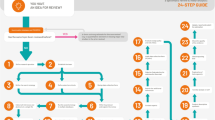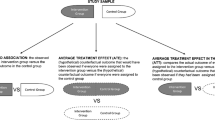Abstract
The Population Studies Research Network of Cancer Care Ontario hosted a strategic planning workshop to establish an agenda for a prevention intervention research program in Ontario, including priority topics for investigation and design considerations.
The two-day workshop included: presentations on background papers developed to facilitate participants’ preparation for and discussions in the workshop; keynote presentations on intervention research concerning primary prevention of chronic diseases, design and study implementation considerations; a dedicated session on critical and creative thinking to stimulate participation and discussion topics; breakout groups to identify, discuss and present study ideas, designs, implementation considerations; and a consensus process to discuss and identify recommendations for research priorities and next steps.
The retreat yielded the following recommendations: 1) develop an intervention research agenda that includes working with existing large-scale cohorts; 2) develop an intervention research agenda that includes novel research designs that could target individuals or groups; and 3) develop an intervention research agenda in which studies collect data on costs, define stakeholders, and ensure clear strategies for stakeholder engagement and knowledge transfer.
The Population Studies Research Network will develop options from these recommendations and release a call for proposals in 2014 for intervention research pilot projects that reflect these recommendations. Pilot projects will be evaluated based on their fit with the retreat’s recommendations, and their potential to scale up to full studies and application in practice.
Résumé
Le réseau de recherche «Étude de la population» d’Action Cancer Ontario a organisé un atelier de planification stratégique afin de fixer l’agenda d’un programme de recherche d’intervention sur la prévention en Ontario, y compris les thèmes prioritaires à aborder et les éléments à considérer dans le plan d’étude.
L’atelier de deux jours incluait: des présentations sur les documents de base élaborés pour faciliter la préparation des participants et leurs discussions durant l’atelier; des allocutions sur la recherche d’intervention axée sur la prévention primaire des maladies chroniques, le plan d’étude et les éléments à considérer dans la mise en œuvre de l’étude; une séance consacrée à la pensée critique et créatrice pour stimuler la participation et les sujets de discussion; la formation de petits groupes pour cerner, discuter et présenter des idées d’étude, des plans d’étude et des éléments à considérer pour la mise en œuvre; et un exercice de consensus pour discuter des priorités de recherche et de la suite des choses et formuler des recommandations.
Ces journées de réflexion ont produit les recommandations suivantes: 1) élaborer un agenda pour la recherche d’intervention incluant l’utilisation des cohortes à grande échelle existantes; 2) élaborer un agenda pour la recherche d’intervention incluant des plans de recherche novateurs qui pourraient cibler des particuliers ou des groupes; et 3) élaborer un agenda pour la recherche d’intervention avec des études pour recueillir des données sur les coûts, identifier les acteurs du milieu et présenter des stratégies claires pour la mobilisation des acteurs et le transfert des connaissances.
Le réseau de recherche «Étude de la population» formulera des options à partir de ces recommandations et lancera un appel de propositions en 2014 pour des projets-pilotes de recherche d’intervention qui reflètent ces recommandations. Les projets-pilotes seront évalués selon leur degré de correspondance avec les recommandations de l’atelier, leur potentiel de transformation en études complètes et leurs possibilités de mise en pratique.
Similar content being viewed by others
References
Canadian Institute for Health Information (CIHI). Seniors and the Health Care System: What Is the Impact of Multiple Chronic Conditions? Ottawa, ON: CIHI, 2011.
Marengoni A, Angleman S, Melis R, Mangialasche F, Karp A, Carmen A, et al. Aging with multimorbidity: A systematic review of the literature. Aging Research Reviews 2011;10(4):430–39.
Prentice RL, Willett WC, Greenwald P, Alberts D, Bernstein L, Boyd NF, et al. Nutrition and physical activity and chronic disease prevention: Research strategies and recommendations. JNCI 2004;96(17):1276–87.
Manuel DC, Perez R, Bennett C, Rosella L, Taljaard M, Roberts M, et al. Seven more years: The impact of smoking, alcohol, diet, physical activity and stress on health and life expectancy in Ontario. An ICES/PHO Report. Toronto, ON: Institute for Clinical Evaluative Sciences and Public Health Ontario, 2012.
Canadian Cancer Research Alliance. Cancer Prevention Research in Canada: A Strategic Framework for Collaborative Action. Toronto: CCRA, 2012.
Cancer Care Ontario, Ontario Agency for Health Protection and Promotion (Public Health Ontario). Taking Action to Prevent Chronic Disease: Recommendations for a Healthier Ontario. Toronto: Queen’s Printer for Ontario, 2012.
Gilligan C, Sanson Fisher R, Anderson AE, D’Este C. Strategies to increase community-based intervention research aimed at reducing excessive alcohol consumption and alcohol-related harm. Drug Alcohol Rev 2011;30(6):659–63.
Crosse SD, Teutsch SM, Haddix AC. Lessons from cost-effectiveness research for United States public health policy. Annu Rev Public Health 2007;28:365–91.
Mazurek Melnyk B, Morrison-Beedy D (Eds). Intervention Research: Designing, Conducting, Analyzing and Funding. New York, NY: Springer Publishing Company, 2012.
IOM (Institute of Medicine). An Integrated Framework for Assessing the Value of Community-based Prevention. Washington, DC: The National Academies Press, 2012.
Carr SM, Lhussier M, Forster N, Geddes L, Deane K, Pennington M, et al. An evidence synthesis of qualitative and quantitative research on component intervention techniques, effectiveness, cost-effectiveness, equity and acceptability of different versions of health-related lifestyle advisor role in improving health. Health Technology Assessment 2011;15(9):iii–iv, 1–284.
Greaves CJ, Sheppard KE, Abraham C, Hardeman W, Roden M, Evans PH, et al. Systematic review of reviews of intervention components associated with increased effectiveness in dietary and physical activity interventions. BMC Public Health 2011;11:119.
McLean RK, Graham ID, Bosompra K, Choudhry Y, Coen SE, Macleod M, et al. Understanding the performance and impact ot public knowledge translation funding interventions: Protocol for an evaluation of Canadian Institutes of Health Research knowledge translation funding programs. Implement Sci 2012;7:57.
Canadian Longitudinal Study of Ageing, 2013. Available at: http://www.clsa-elcv.ca (Accessed November 25, 2013).
Canadian Partnership for Tomorrow (CPT) Project, 2013. Available at: http://www.partnershipagainstcancer.ca/priorities/2007-2012-initiatives/strategic-initiatives-3/canadian-partnership-for-tomorrow-project (Accessed November 25, 2013).
Scientific American. Citizen Science, 2013. Available at: http://www.scientificamerican.com/citizen-science/ (Accessed November 25, 2013).
Rose G. Sick individuals and sick populations. Int J Epidemiol 1985;14(1):32–38.
Commission on Social Determinants of Health (CSDH). Closing the gap in a generation: health equity through action on the social determinants of health. Final Report of the CSDH. Geneva, Switzerland: World Health Organization, 2008.
Fortier I, Burton PR, Robson PJ, Ferretti V, Little J, L’Heureux F, et al. Quality, quantity and harmony: The DataSHaPER approach to integrating data across bioclinical studies. Int J Epidemiol 2010;39(5):1383–93.
Ioannidis JPA, Adami H-O. Nested randomized trials in large cohorts and biobanks: Studying the health effects of lifestyle factors. Epidemiology 2008;19(1):75–82.
Relton C, Torgerson D, O’Cathain A, Nicholl J. Rethinking pragmatic randomized controlled trials: Introducing the “cohort multiple randomized controlled trial” design. BMJ 2010;340:c1066.
Howe G, Lindsay J. A generalized iterative record linkage computer system for use in medical follow-up studies. Computers in Biomedical Research 1981;14:327–40.
Capewell S, Graham H. Will cardiovascular disease prevention widen health inequalities? PLoS Med 2010;7(8):e1000320.
Campbell M, Fitzpatrick R, Haines A, Kinmonth AL, Sandercock P, Spiegelhalter D, et al. Framework for design and evaluation of complex interventions to improve health. BMJ 2000;321(7262):694.
Craig P, Dieppe P, Macintyre S, Michie S, Nazareth I, Petticrew M. Developing and evaluating complex interventions: The new Medical Research Council guidance. BMJ 2008;337:al655.
Jenkins A, Christensen H, Walker JG, Dear K. The effectiveness of distance interventions for increasing physical activity: A review. Am J Health Promot 2009;24(2):102–17.
Webb TL, Joseph J, Yardley L, Michie S. Using the internet to promote health behavior change: A systematic review and meta-analysis of the impact of theoretical basis, use of behavior change techniques, and mode of delivery on efficacy. J Med Internet Res 2010;12(1):e4.
Kennedy CM, Powell J, Payne TH, Ainsworth J, Boyd A, Buchan I. Active assistance technology for health-related behavior change: An interdisciplinary review. J Med Internet Res 2012;14(3):e80.
Author information
Authors and Affiliations
Corresponding author
Additional information
Sources of support: The workshop on which this commentary was based was supported by Cancer Care Ontario. Neither the process of the workshop nor the preparation of the commentary was influenced by the funder.
Acknowledgements: Lyle Palmer was formerly Executive Scientific Director of the Ontario Health Study.
Conflict of Interest: None to declare.
Rights and permissions
About this article
Cite this article
Ashbury, F.D., Little, J., Ioannidis, J.P.A. et al. A vision for chronic disease prevention and intervention research: Report from a workshop. Can J Public Health 105, e150–e153 (2014). https://doi.org/10.17269/cjph.105.4039
Received:
Accepted:
Published:
Issue Date:
DOI: https://doi.org/10.17269/cjph.105.4039




